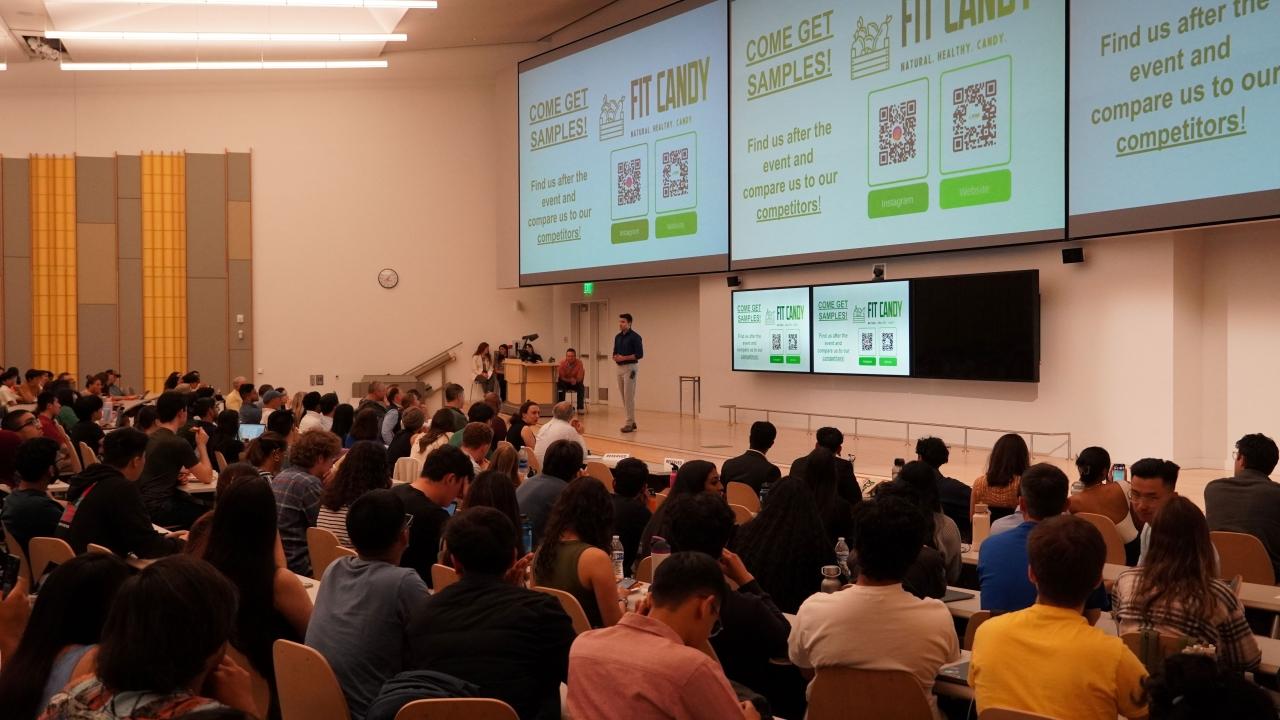
The Student Startup Center at the University of California, Davis, shined a spotlight on student-led startups at PLASMA Demo Day, the culminating experience of their 12-week early-stage cohort accelerator program.
Ten teams of undergraduate student entrepreneurs pitched their companies to industry experts in front of a packed California Hall on May 2. Of them, five were awarded more than $25,000 in prizes.
The top prize was awarded to EpiSense, a discrete, wearable device that aims to prevent injuries from seizures. Undergraduate student co-founders Simran Lallian and Jaya Athuluru will use the $10,000 award earned at Demo Day to prototype the hardware, software and app for an electroencephalogram, or EEG, headband.
“Winning first place at PLASMA's Demo Day was an incredible accomplishment for our team,” Lallian and Athuluru said in an email. “PLASMA has helped us to dive deeper into building our startup, and we will use these tools to look into FDA approval, apply for grants and continue to develop our business model.”
PLASMA facilitates networking with mentors and educational lessons with industry leaders, two opportunities for which the EpiSense team is especially appreciative.
“The amazing people we have met throughout this process have been the highlight for us,” they explained. “From industry professionals to mentors and those at the Student Startup Center, we are immensely grateful for the support we have received.”
Second place went to The Make Box, led by electrical engineering major Kavya Khare and computer science major Natasha Parker. The Make Box provides creative, hands-on DIY robotics kits with online educational programs and mentorship opportunities for middle school students and parents interested in innovative STEM education.
Tallyrus, led by Gautham Pandian and Ashwin Chembu in the Department of Computer Science, won third place. The AI-powered essay grading tool offers time-strapped educators rapid, detailed and tailored feedback on student writing.
The Mentor’s Choice Award went to WaveLength, a dating app that uses musical compatibility to match users. It was selected based on mentor feedback to the team that best exemplified tenacity and teamwork.
Fit Candy, a healthy, low-calorie and all-natural candy alternative made from upcycled watermelon rinds led by (4th year FST) undergraduate food scientist Dion Skaria, was selected for two prizes: Audience Choice and the Karim Abou Najm Research and Innovation Memorial, or KARIM, Award.
While the Audience Choice Award was identified based on ranked choice voting from more than 600 attendees, the KARIM Award was selected by the parents of Karim Abou Najm. Established in honor of Karim Abou Najm, who established his company, Cornische, and participated in PLASMA, the award recognizes the team that best utilized university research and mentorship resources through meaningful relationships with faculty.
“Karim's award means a lot to us. It carries our son's name and his passion for innovation and research,” said Nadine Yehya, Karim Abou Najm’s mother. “While all the teams did a very impressive job pitching their wonderful products and solutions, Fit Candy was distinguished in the close collaboration with the faculty on researching and testing the product. Also, the product itself has great market potential as a healthy and tasty fruit-based candy, which could be extended to other varieties. We hope the KARIM Award will give Dion and all PLASMA participants a bigger incentive to succeed and make a difference in this world.”
The PLASMA program is an opportunity for undergraduate student entrepreneurs to learn modern job skills and solve big problems, explained Aaron Anderson, director of the Student Startup Center.
"At the Student Startup Center, we're all about helping student founders solve some of the biggest problems on the planet," said Anderson.
Next year’s PLASMA program applications go live in the fall quarter.
